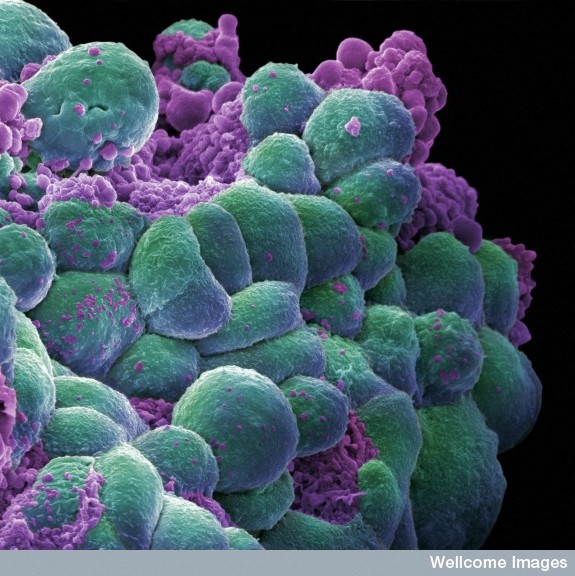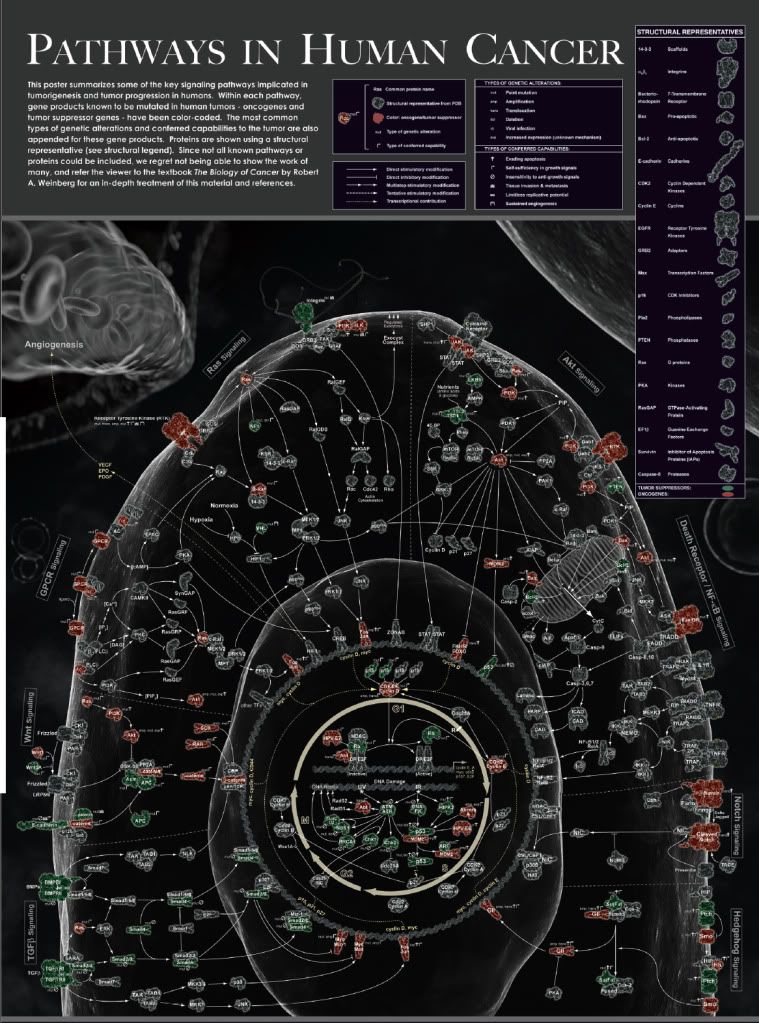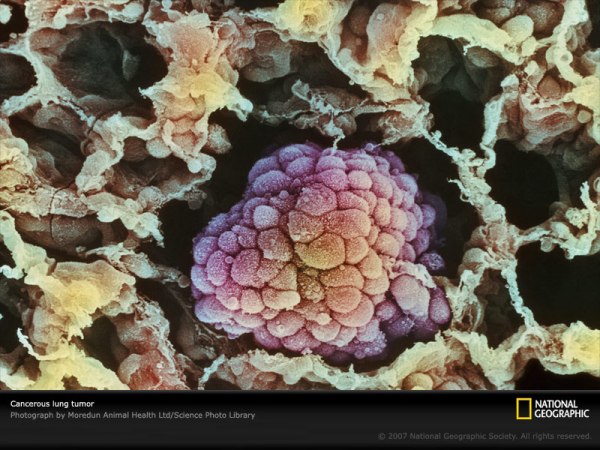In this post, I hope to introduce you to what cancer is, since this is crucial to understanding it and towards the development of therapies for it. Please note that references will be inline and linked-in.

The first thing I want to mention is that cancer is not a single disease, nor does it have a single cause, nor do all cases of cancer have a similar pathology, it is a group of diseases that are extremely varied in terms of what drives them and causes them to persist in the body, eventually making them potentially lethal. At the same time, it is possible to define cancer based on similarities that exist in all cancer cells.
Before I go on to write about that, I wish to tell you about things like cellular homeostasis and the properties of normal cells, in most eukaryotes, the process of cell division is tightly regulated, genetically, and as a consequence normal cells just don’t divide out of control.
Using the above statement, it is possible to arrive at an operational definition for purposes of this post, that cancer is the phenomenon of dysregulated cell division, or to put it in another way, cell division gone haywire.
What features define Cancer Cells?
[youtube]http://www.youtube.com/watch?v=JYXaF7ZJ ... r_embedded[/youtube]
Cancer cells, while being extremely heterogenous (varied) , also have some universally present features, and here I wish to point you to the paper as far as this area is concerned. (Hahnahan & Weinberg, The Hallmarks of Cancer, Cell, Volume 100, Issue 1, 7 January 2000, Pages 57-70) which you may duly find at http://www.sciencedirect.com/science?_o ... archtype=a
They go on to specify the acquired traits that are universally common to all known cancer cells, including
[1] Self sufficiency in growth signals – this means they can drive their own replication without external control, this can be conferred by mutations in proteins that regulate cell division. These mutations happen in ways that allow cells to activate signalling pathways that trigger growth even if an otherwise-necessary external signal is absent.
Genes which can, upon mutation, give rise to these genes are called proto-oncogenes, and the aberrant forms are called oncogenes, it is a term you can expect to come across regularly if you wish to learn more about cancer.
[2] Insensitivity to anti-growth signals – It may make sense for you to imagine cellular growth being the result of a balance between growth signals and anti-growth signals, with the two sets of entities being involved in a dynamic equilibrium. It is possible for mutations to wreck the pathways that keep growth in check, thus upsetting the balance and allowing otherwise normal levels of growth signals to drive proliferation. Genes which are normally active in preventing this kind of uncontrolled growth are called tumour suppressor genes.
[3] Ability to evade apoptosis – in case cells do go kaput due to genetic aberrations, it is quite normal for those cells to be pushed into a non-replicating state or towards cellular suicide, cancer cells have to avoid this fate to be successful (from the cancer’s point of view)
, they can do this by acquiring dysfunctional pathways of apoptosis involving defective versions of more tumour suppressors or by producing more proteins that can prevent apoptosis from happening. (Again the idea of an equilibrium would hold, here)
[4] Limitless replicative potential – this is extremely crucial to cancer cells because of their high rate of replication, you see, there are sequences at the ends of chromosomes, called telomeres, and every time a cell divides, due to a biochemical kink in the mechanisms of DNA replication, they shorten. The faster a cell divides the faster they shorten, too. Eventually, when the ends of chromosomes end up being exposed they are prone to fusing haphazardly with other cells, which sends the cell to a dysfunctional state and a lethal end.
Cancer cells, however, can reactivate pathways that prevent telomeres from becoming shorter, one pathway involves the use of an enzyme called telomerase and the other one uses a process that is called ALT (Alternative Lengthening of Telomeres). Both of these allow cancer cells to go on replicating in their merry ways, and eventually bring about the death of the host if left untreated. They can, of course, evolve resistance to therapy and kill the patient even if treated, but that is another matter.
[5] Sustained angiogenesis – now cancer cells are hungry little buggers, and that is no wonder since they grow so fast, and this requires energy and oxygen for cellular biochemistry which is needed for growth to take place, and in the body, cells get these resources from the blood.
Cancer cells have to find a source of blood, and to do this they use a process called angiogenesis, which tells blood vessels to spread capillaries to the vicinity of the tumour so that blood supply can be established.
[youtube]http://www.youtube.com/watch?v=ibvzuVw6 ... r_embedded[/youtube]
[6] Metastasis & Tissue invasion – ultimately, tumours that just sit in their original location aren’t as dangerous as ones that spread, it is the process of spreading that is called metastasis, and tumours that can do this are said to be malignant (as opposed to benign if they cannot), this requires cancer cells to gain the ability to move and to survive in the bloodstream. It is metastasis that is the most lethal facet of cancer, for the original tumour can spawn offshoots elsewhere in the body, clogging up organs, causing excruciating pain, and eventually, through organ failure, the death of the patient.
[youtube]http://www.youtube.com/watch?v=rrMq8uA_ ... r_embedded[/youtube]

The illustration above captures the essence of what has been described above.
What causes cancer?
This is a tricky question, but if you look at what has been written above you may be able to discern the role of mutations in cancer, and mutations are, at the most fundamental level, responsible for cancer. It is a disease of genes. Now there are different kinds of mutations that act in different ways, and they are all essentially stochastic (statistically indeterminate) and as a result there can be several routes to cancer.
For example point mutations can produce a misfolded/dysfunctional growth signalling protein which can go on to trigger uncontrolled growth, or can knock out a tumour suppressor, or in cases where bits of different chromosomes get fused together they may produce a gene whose expression is not regulated properly, this happens in the case of the Bcl-Abr fusion gene in Chronic Myelogenous Leukaemia, where the aberration is known as the “Philadelphia Chromosome”. To sum up, any mutation which disturbs cellular homeostasis such that the affected cells begin to acquire some of the aforementioned characteristics can cause cancer. Viral infections such as Human Papilloma Virus can play a vital role in the development of Cervical cancer.
Now it is eminently possible for a variety of risk factors to exacerbate the risk of some of those mutations happening, it is like having better chances of winning by throwing dice more often, these can include inherited factors (for example, if you get a defective tumour suppressor gene from one of your parents, it is easier for mutation to knock out the other copy, leading to cancer), this is seen in some cases of Retinoblastoma and in some cases of Breast Cancer or other environmental influences, including ionizing radiation, ultraviolet radiation, tobacco products, pollutants and so on. These substances are called Carcinogens.
Now, there is a common misconception amongst people, at least to the extent that I’ve seen, who assert that things like smoking are ok because they know of smokers who didn’t get lung cancer. That assertion is nonsense, because tobacco smoke increases the risk of being hit by a cancer-triggering mutation by increasing the overall mutation rate in the tissues it comes into contact with. Still not convinced? Try this paper which offers a large scale review http://jnci.oxfordjournals.org/content/91/14/1194.short, and this too, http://cancerres.aacrjournals.org/conte ... 3419.short if you would like.
Why is Cancer such a bitch to treat?
To put it simply, evolution. One of the other defining features of cancer cells is genomic instability, in other words, there is an enormous amount of mutations happening, genes jumping from here to there, chromosomes sticking up to each other in different ways, different genes undergoing different mutations in different cells of the same tumour and so on, for starters. (This was mentioned, if you recall, in the video showing cancer cells in culture posted towards the beginning)
This means that it is always likely that treatment will end up wiping out a vulnerable subset of cancer cells leaving behind others which are resistant. It also does not help that cancer cells can find ways to evolve resistance to drugs by finding genotypes (through mutation, of course) that allow them to express proteins that can pump chemotherapeutic drugs out of cells. Genes like Mdr1 can do this.
It also doesn’t help us (and helps cancer cells) that there can be more than one way to obtain a necessary trait. For example, cells can bypass apoptosis by either losing functional p53 or by gaining duplicated copies of Mdm2, or by having defective caspases or by overexpressing Bcl2 which can block apoptosis. It is testament to the dodgy, convoluted nature of evolution that the pathways that govern the functioning of our cells are capable of being wrecked so easily, these pathways are prone to breakage and may have more maintenance issues than a Jaguar XK in the course of their functional lifetime.
Cells which can divide quickly have a selective advantage, too, to make things worse, and in the context of cellular homeostasis in the body the features that were described in the first part of the post the traits that cancer cells eventually acquire give them a great advantage. Cells can get f**ked up in several ways, to sum it all up.
How many ways, you ask?
Try this for a sense of perspective.

A high resolution .PDF of the poster can be found at http://www.cellsignal.com/about/marketi ... poster.pdf
So yeah, things are tough on the oncology front at the moment, but the more we learn, and the more we study the disease, it doesn’t seem unlikely that we will find things that are not heterogeneous, things that don’t vary too much, things that can be treated without cells being able to develop resistance. There is cause for optimism, which I feel is genuine, seeing reports like this one http://dx.plos.org/10.1371/journal.pone.0009584
I hope to continue to post a lot more about various little things pertaining to the study and the treatment of cancer in the near future, I’m now signing off from this little introduction by pointing you to a textbook that has taught me, hopefully well, and continues to teach a great many students around the world about the biology of cancer. The book is “The Biology of Cancer” by Robert A.Weinberg.
What follows is a video montage of electron micrographs taken by scientists from CRUK’s (Cancer Research UK’s) London Research Institute’s Electron Microscopy Unit.
[youtube]http://www.youtube.com/watch?v=8uWWpdyf ... r_embedded[/youtube]

This image shows how cancer can be characterised by aggressive, invasive growth.

Ovarian tumour.

Lung Tumour.
If you are interested in reading my blog you may find it at exploreable.wordpress.com